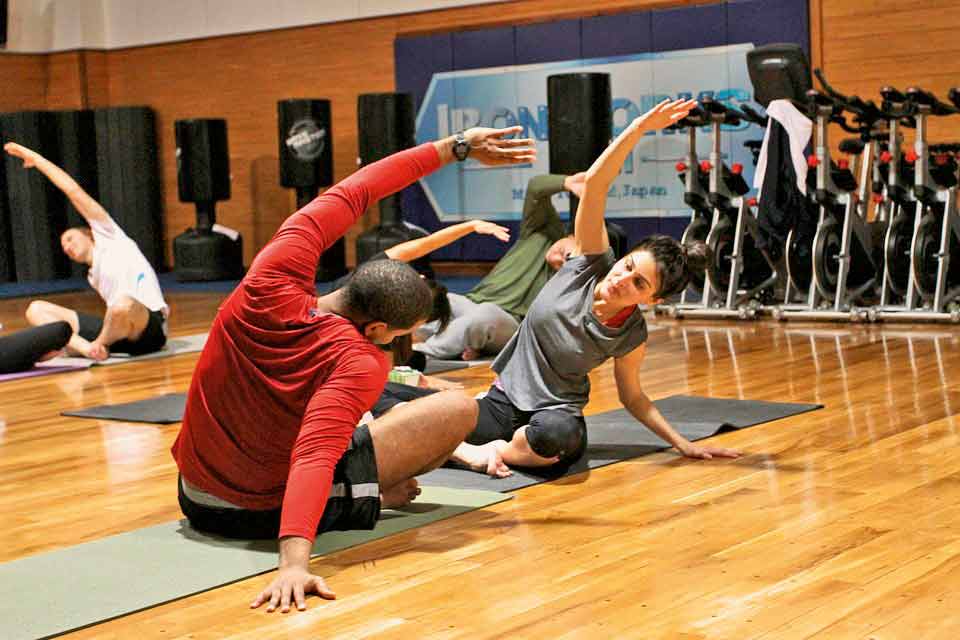
I have been teaching fitness for the last 16 years. Of course, there have been marvellous ‘before’ and ‘after’ photo-ops even after the first three months of regular exercise for most women. Then there has been the weighing scale that is feared and hated. It spells doom for some and sends others into throes of ecstasy. It’s just a number; still, women are highly influenced by it.
There is however another more lasting and highly under-recognised benefit of fitness. Many people enjoy being part of a fitness group or organisation that gives them a social outlet and connects them to others. The gym becomes the new social hangout to meet like-minded people and make friends. The like-mindedness being the common goal to better health/wellness.
Many friendships have been born in the gym! People who start by just chatting with each other, go on to catch up over coffee later, and for some, it is the start of an everlasting friendship.
Many of these relationships may not have happened had it not been for their chance meeting through fitness. There are several advantages to these friendships. The first, of course, is that you get to make friends. In today’s highly virtual world, real connections are quite a challenge. But when people meet in group sessions such as in a gym, connecting with others in the real world is possible.
Working out with a partner or group cultivates the habit of regular exercise.
Working out together enhances a bond as you sweat and exercise to better health. The high endorphin levels may have something to do with being more congenial and open to friendships. Friendships are after all the chain that links people.
Working out with an exercise partner or group also ensures that you persist with it. This then goes beyond just friendships and happy feelings. It cultivates the habit of regular exercise.
When in the company of friends whom you work out with, you tend to push beyond what you would probably do on your own. Your partner’s success or dedication motivates you to do better, and averts boredom and monotony.
Regular exercise often translates into healthier lifestyle. As you know, the one-hour of exercise will not mitigate the remaining 23 hours if they are spent irresponsibly. Eating healthy, moving a lot, not smoking, minimising alcohol, managing stress and getting enough sleep are as important as that holy hour in the gym. All these become more attainable when you surround yourself with like-minded people. It’s not necessarily true that your gym buddies also share your social life, but chances are you will stay connected, and together, remind each other of healthier choices, share healthy recipes, provide solutions for setbacks, encourage each other on a bad day and so on. Research has shown that you will imitate the lifestyles of the people you cultivate friendship with.
A 2011 study published in the Psychology of Sport and Exercise found that exercise habits of people you know have a positive influence on your own exercise habits. So, for instance, having someone join you on an early morning run would mean that you feel obliged to sleep early, wake up early and get moving to uphold the bargain.
You could either partner with one or two specific people to work out or be part of a group that acts as a support system. We are all social animals; so, having a social connection, even while working out can be of great benefit.
If you do choose to partner with someone, remember:
- The person does not need to be your best friend but you do need to ‘like’ him/her.
- Your fitness levels and health parameters should not be overly mismatched as then you may be held back instead of moving forward.
- You need to feel accountable to and responsible for your partner encouraging and committing to the process. Provide positive reinforcement whenever possible and see that both of you progress. Sometimes having a partner can be a deterrent if either of the two is lazy and holds the other back.
If you choose to join a group, remember:
- The fitness activity done as a group has to be in sync with your requirement. Many group activities are generic and may not entirely suit your fitness needs.
- The group leader, usually the instructor, needs to be highly empathetic and extremely qualified to take the entire group together forward while avoiding injury given the different levels of fitness of the people involved.
- You may need to do some solo activities to fill in the gaps in your fitness. The group activity, for instance, may not include strength training. You may then be required to do that separately.
Finding the right partner or group can be of great benefit to sustain and even enjoy exercise. The support system, accountability and healthy competition and inspiration provided, usually act to cheer you on, especially on days when you want to play truant.
The author, an Obstetrician and Gynaecologist, is a Fitness & Lifestyle Consultant, and has published two books: Get Size Wise; Gain to Lose.





